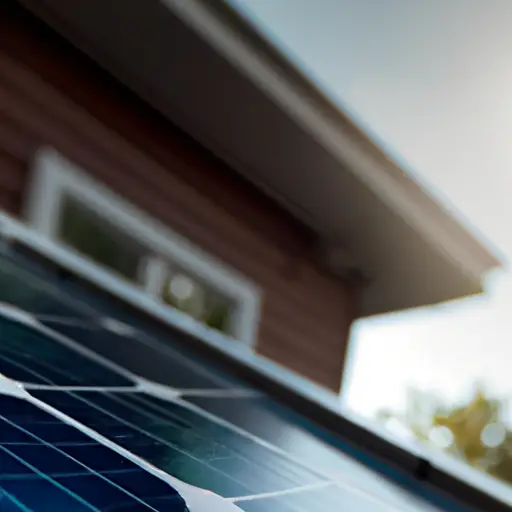Have you ever wondered why some people choose to live off the grid? It seems counterintuitive in our modern world where electricity, water, and other basic utilities are readily available. However, there are numerous reasons why individuals opt for this alternative lifestyle. In this article, we will dive into the topic of off-grid living, exploring the various motivations behind this decision.
Living off the grid means disconnecting from mainstream utilities and relying on self-sustainable energy sources and resources. It involves generating your own electricity, collecting rainwater, growing your own food, and managing your waste independently. While it may seem like a daunting and unconventional choice, many people find it appealing for several reasons.
One of the primary motivations for off-grid living is the desire for self-sufficiency and independence. By generating their own power and growing their own food, individuals can reduce their reliance on external systems and become more self-reliant. This can be a way to break free from the consumerist lifestyle and regain control over one’s own resources.
In addition to self-sufficiency, off-grid living is also driven by a concern for the environment. By relying on renewable energy sources such as solar or wind power, individuals can reduce their carbon footprint and minimize their impact on the planet. This lifestyle allows people to live more in harmony with nature, adopting sustainable practices that promote conservation and eco-friendly living.
In the following article, we will explore in more detail the specific reasons people choose to go off-grid, from seeking a simpler and more fulfilling life to wanting to disconnect from the stress and demands of modern society. Understanding these motivations can shed light on the growing popularity of off-grid living and provide insights into the benefits it can offer.

Pros and Cons of Off-Grid Living
Off-grid living, the lifestyle of being self-sufficient and disconnected from public utilities, has become increasingly popular in recent years. People are drawn to the idea of reducing their carbon footprint, living closer to nature, and gaining independence from traditional grid systems. However, before making the decision to go off-grid, it is essential to consider the pros and cons of this unique lifestyle. In this article, we will explore the reasons behind off-grid living, its advantages, disadvantages, and the various factors that contribute to its increasing popularity.
Environmental Reasons for Going Off-Grid
Reducing carbon footprint
One of the primary motivations for embracing off-grid living is reducing one’s carbon footprint. By generating self-sustainable energy through renewable sources like solar power or wind turbines, off-grid individuals can greatly decrease their reliance on fossil fuels and lower their overall greenhouse gas emissions. This environmentally conscious choice helps mitigate climate change and promotes a more sustainable future.
Preserving natural resources
Off-grid living promotes the responsible use of natural resources. Individuals in off-grid communities are more likely to adhere to sustainable practices such as water conservation, waste reduction, and organic gardening. By actively managing their resources, they ensure the longevity of these finite assets and protect the environment for future generations.
Protection of wildlife
Living off-grid often involves residing in remote areas with abundant wildlife. Off-grid communities prioritize the preservation of natural habitats and strive to coexist with the flora and fauna around them. By minimizing human interference and reducing pollution, off-grid living creates a harmonious environment where wildlife can thrive undisturbed.
Self-Sufficiency and Independence
Freedom from utility bills
One of the most appealing advantages of off-grid living is the freedom from utility bills. By producing their own energy and relying on renewable sources, off-grid individuals are no longer beholden to fluctuating electricity prices or the rising costs of other public utilities. This financial independence allows individuals to allocate their resources more efficiently and expedites their journey towards self-sufficiency.
Reducing dependence on external resources
Off-grid living encourages individuals to rely on their own capabilities instead of external resources. By developing essential skills such as gardening, food preservation, and basic construction, off-grid dwellers become less reliant on supermarkets, grocery stores, and professional service providers. This self-reliance not only fosters personal growth but also grants individuals a sense of empowerment and resilience.
Developing essential skills
Living off-grid requires individuals to acquire a diverse skill set. From building and maintaining renewable energy systems to cultivating crops and preserving food, off-grid dwellers become adept at various tasks essential for their survival. These skills not only provide individuals with practical knowledge but also foster a sense of accomplishment and self-sufficiency.

Escape from the Grid
Seeking solitude and peace
The desire for solitude and tranquility is a significant motivation for many individuals seeking off-grid living. By distancing themselves from the hustle and bustle of mainstream society, off-grid dwellers can find solace in the serenity of remote locations. It offers an escape from crowded cities, noise pollution, and the frenetic pace of modern life.
Disconnecting from technology
Living off-grid offers an opportunity to disconnect from the constant bombardment of technology. With limited access to the internet, television, and social media, off-grid individuals can focus on more meaningful interactions with nature and their community. This disconnection allows for a deeper connection with oneself and the world around them.
Living closer to nature
Off-grid living enables individuals to immerse themselves in the natural world. Surrounded by untouched landscapes, off-grid dwellers have the unique opportunity to connect on a profound level with nature. They can witness the changing seasons, observe diverse wildlife, and marvel at the beauty of starry night skies without the interference of artificial lighting.
Financial Considerations
Cost savings over time
While the initial investment in off-grid living can be substantial, it offers significant cost savings over time. By eliminating monthly utility bills, off-grid dwellers can redirect their funds towards other priorities such as healthcare, education, or personal investments. The financial benefits of off-grid living extend beyond immediate savings, providing individuals with long-term financial security and stability.
Alternative ways to generate income
Off-grid living encourages individuals to think creatively and find alternative sources of income. Whether through selling surplus crops, offering eco-tourism experiences, or providing specialized services within their community, off-grid dwellers have the opportunity to generate income while maintaining their self-sufficiency. This entrepreneurial mindset fosters innovation and self-reliance, ensuring a more sustainable livelihood.
Social and Community Aspects
Creating a tight-knit community
Off-grid living promotes the formation of tight-knit communities where individuals share common values and goals. Working together towards self-sufficiency, off-grid dwellers often develop strong bonds and mutual support systems. This sense of community creates a supportive and nurturing environment, fostering a collective spirit of collaboration and cooperation.
Sharing resources and knowledge
Off-grid living encourages the sharing of resources and knowledge within a community. Residents can pool their skills, tools, and expertise to benefit the entire community. Whether it is collective gardening, sharing renewable energy systems, or offering workshops on sustainable living, off-grid communities thrive on the principle of cooperation and mutual aid.
Challenges and Limitations
Initial investment and maintenance costs
One of the primary challenges of going off-grid is the initial investment required in setting up self-sustainable systems. The cost of installing solar panels, wind turbines, water filtration systems, and other off-grid infrastructure can be significant. Additionally, ongoing maintenance and repair expenses may also arise. However, it is important to view these costs as long-term investments that provide financial and environmental benefits over time.
Unpredictable weather conditions
Off-grid living is more vulnerable to unpredictable weather conditions. Extreme weather events such as storms, heatwaves, or prolonged periods of cloudy weather can impact energy generation or compromise the availability of essential resources. Off-grid dwellers must prepare for such contingencies by implementing backup systems and considering alternative solutions for their energy and water needs.
Limited access to amenities
Living off-grid often means sacrificing immediate access to certain amenities commonly found in urban areas. Off-grid individuals may have to travel longer distances for groceries, medical services, or other essential supplies. Additionally, amenities such as high-speed internet, entertainment venues, and cultural events may be less accessible, requiring individuals to adapt to a simpler and more self-sufficient lifestyle.
Technological Advancements in Off-Grid Living
Solar power systems
Advancements in solar power technology have revolutionized off-grid living. Solar panels are more efficient and affordable than ever, allowing individuals to generate significant amounts of electricity from sunlight. With developments in battery storage and energy management systems, off-grid individuals can store excess energy for use during periods of low or no solar generation.
Water filtration and storage solutions
Innovative water filtration and storage solutions have made off-grid living more feasible and sustainable. Rainwater collection systems, water purification devices, and water recycling techniques enable off-grid dwellers to ensure a consistent supply of clean water. These advancements also alleviate concerns regarding water scarcity, especially in arid or remote regions.
Innovative waste management
Off-grid living encourages innovative approaches to waste management. Composting systems, recycling practices, and eco-friendly disposal methods minimize the environmental impact of human waste. Additionally, off-grid communities often prioritize reducing waste in the first place through conscious consumption and resource conservation.
Regulatory and Legal Considerations
Building codes and permits
When considering off-grid living, it is important to familiarize oneself with local building codes and permit requirements. Depending on the jurisdiction, off-grid dwellers may need to adhere to specific regulations regarding water and waste management, renewable energy systems, and overall construction standards. Ensuring compliance with these guidelines is essential to avoid legal complications and ensure the safety and sustainability of off-grid homes.
Zoning and land use regulations
Zoning and land use regulations play a key role in off-grid living. Some areas may have restrictions on building structures or regulations that limit the use of certain types of renewable energy systems. Prior research and consultation with local authorities are crucial to understanding the zoning and land use regulations specific to the desired off-grid location.
Health and safety requirements
Living off-grid does not exempt individuals from health and safety standards. Off-grid dwellers must prioritize fire safety, sanitation, and emergency preparedness to ensure their well-being. Installing smoke detectors, properly maintaining renewable energy systems, and having a comprehensive emergency plan are essential factors to minimize risks associated with off-grid living.
Conclusion
The reasons behind off-grid living are diverse and multifaceted. From environmental considerations and the desire for self-sufficiency to the appeal of solitude and freedom, the motivations for embracing this lifestyle are as unique as the individuals themselves. As technological advancements continue to support off-grid living and as more people recognize the importance of sustainable practices, the popularity of this lifestyle is expected to grow. By exploring personal motivations, understanding the advantages and disadvantages, and considering the future of off-grid communities, individuals can make informed choices as they explore the possibilities of off-grid living.




